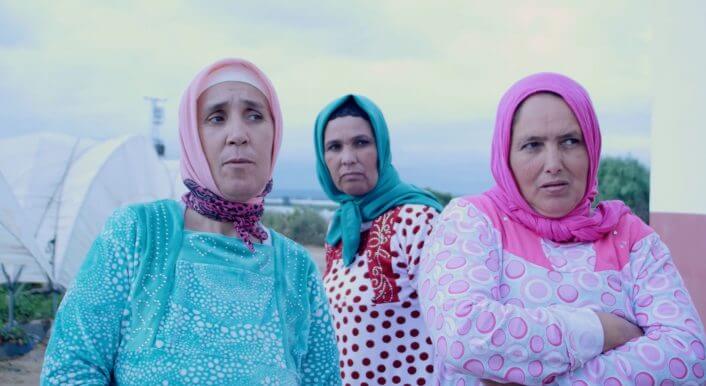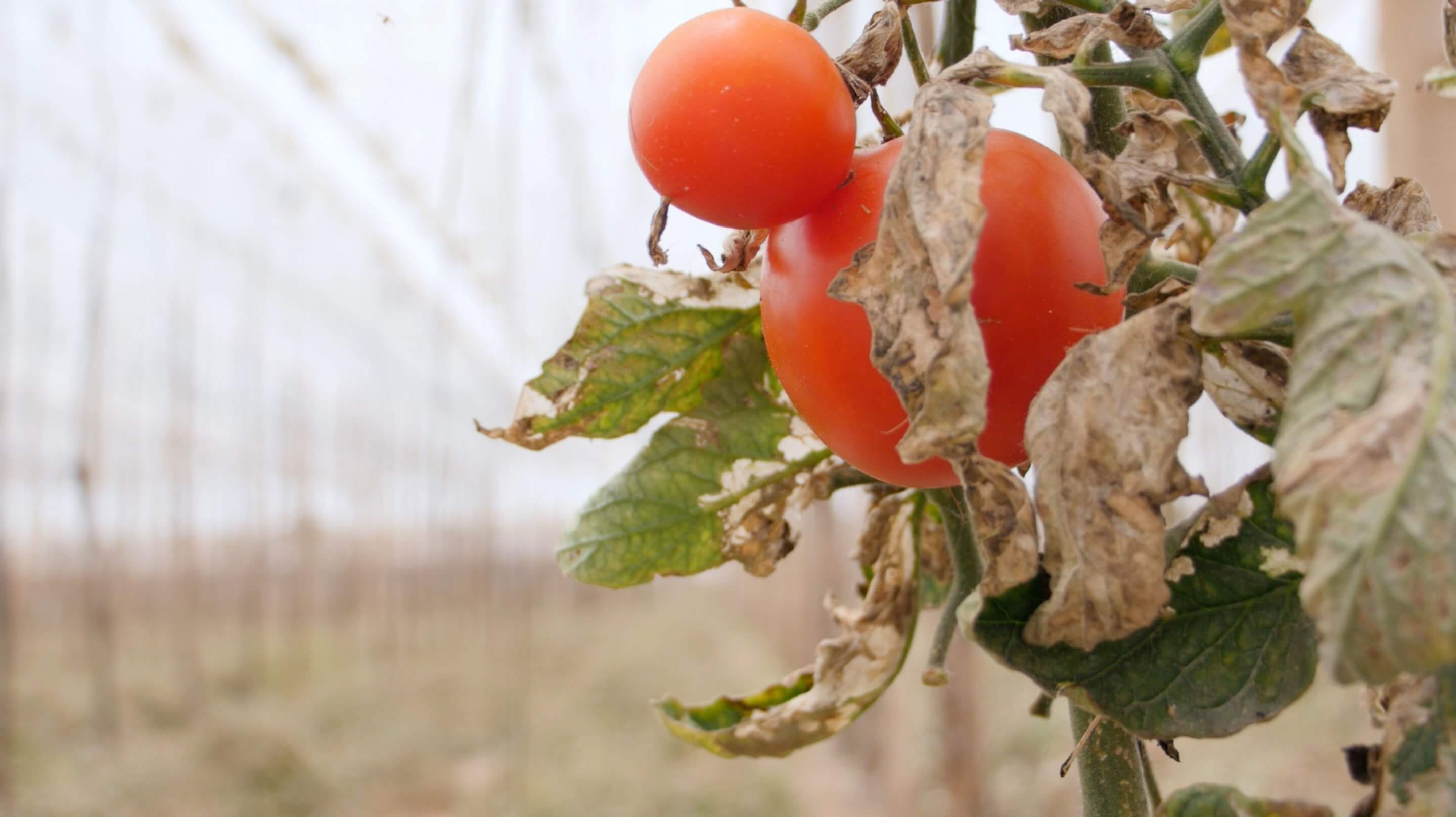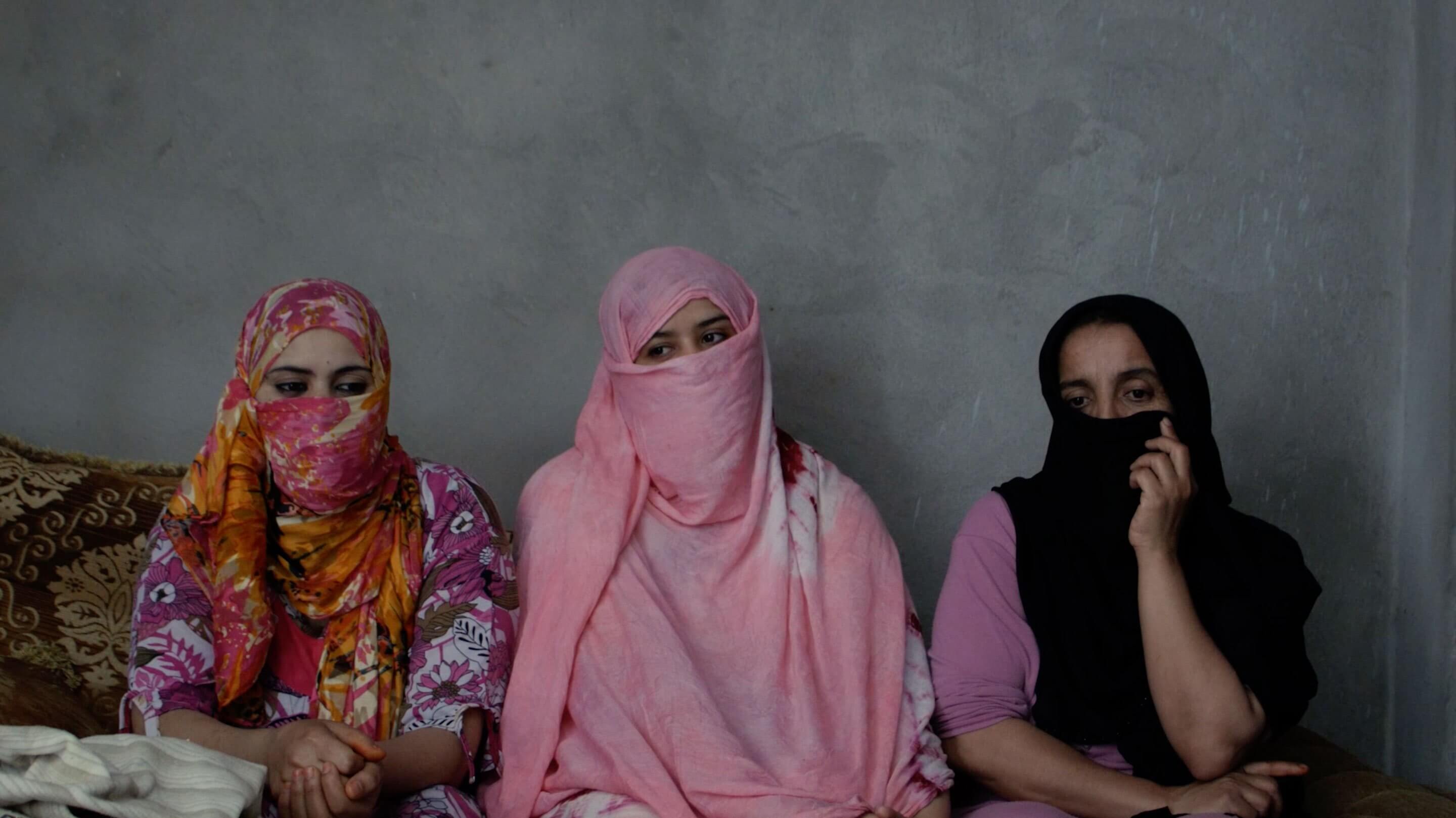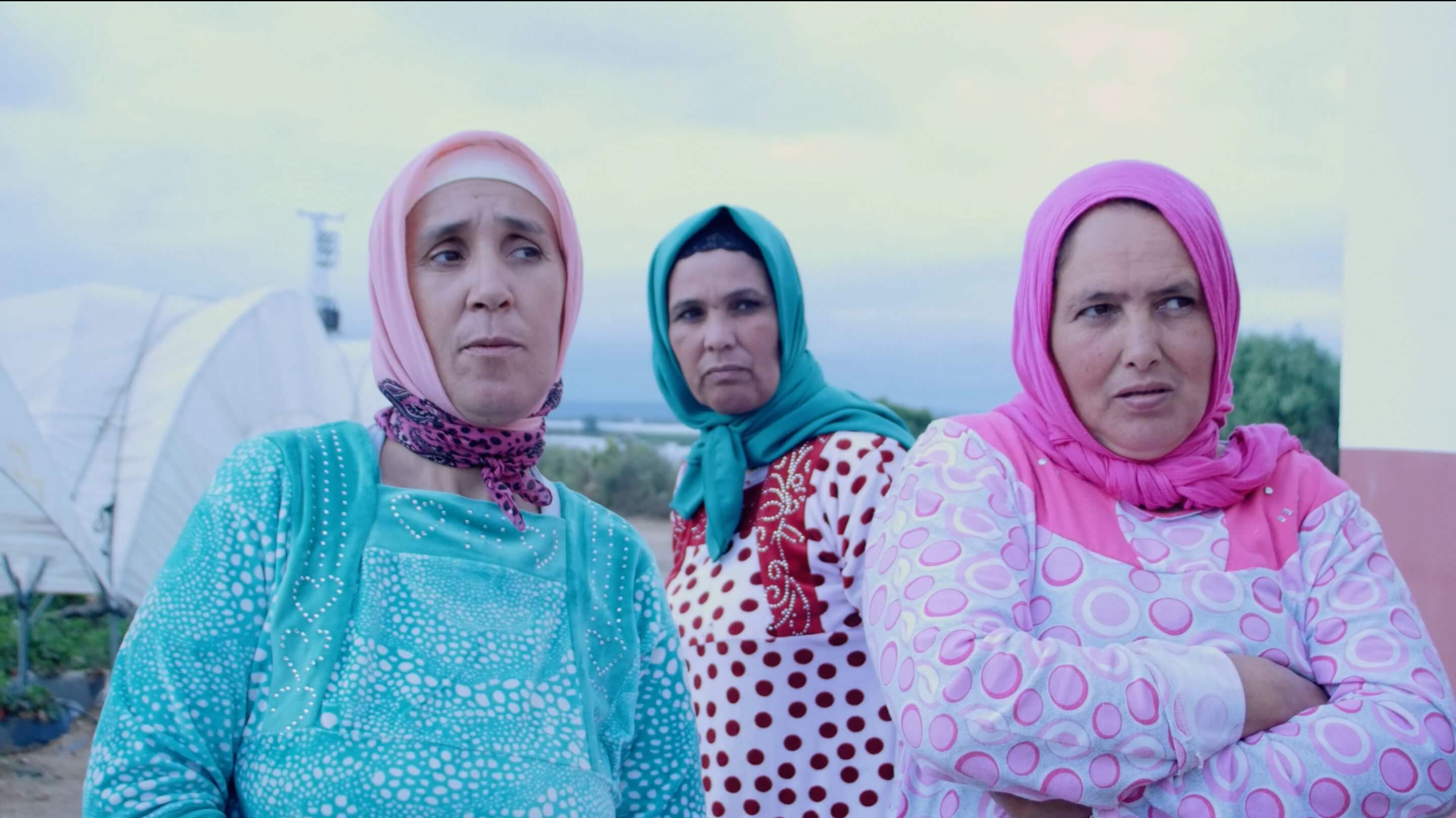
Rape in the fields
Harassed, insulted and raped – that is everyday for thousands of women working in tomato and strawberry fields of Spain, Italy and Morocco. The vegetables and fruits they harvest are sold in German supermarkets and all over Europe. First part of our investigation of workers’ sexual abuse in Spain, Morocco and Italy.
Part 1: Rape in the fields
Part 2: The dark side of Morocco’s booming agricultural exports
Part 3: In the hands of the mafia
This investigation is a cooperation with RTL Nachtjournal and BuzzFeed News.
It’s May 3, 2017, in a café in the Southern Spanish town of Palos de la Frontera, when Kalima takes a life-changing decision. Around her people are chatting, eating lunch. She works on a strawberry farm few kilometres away and life there is hell: No kitchen, shower only once a week, one room for six women to sleep in. And then there is her supervisor, Abdelrahman, a man from Morocco. “He comes in the evening”, she says.
“He has the phone numbers of all the women.” He forces them to have sex with him. Every night with a different woman. “When you say no, he punishes you at work”, she says. Kalima is afraid of her supervisor, who has not been charged with a crime. This is why Kalimas name, that of her supervisor and boss have been changed. She has been here since March and she has nothing more to lose. She will return to the farm for only a last time.
On that day in the restaurant, Kalima decides to report the rape, making her a rare exception. These women typically remain silent out of fear to lose their job, which makes it hard to grasp the scope of the problem. Their silence is perpetuated by a civil society and justice system that does little to nothing to help them. CORRECTIV spoke to dozens of female workers in Spain’s Huelva region, most of them Moroccan, who reported having been harassed, raped, blackmailed, physically assaulted or insulted by their superiors.
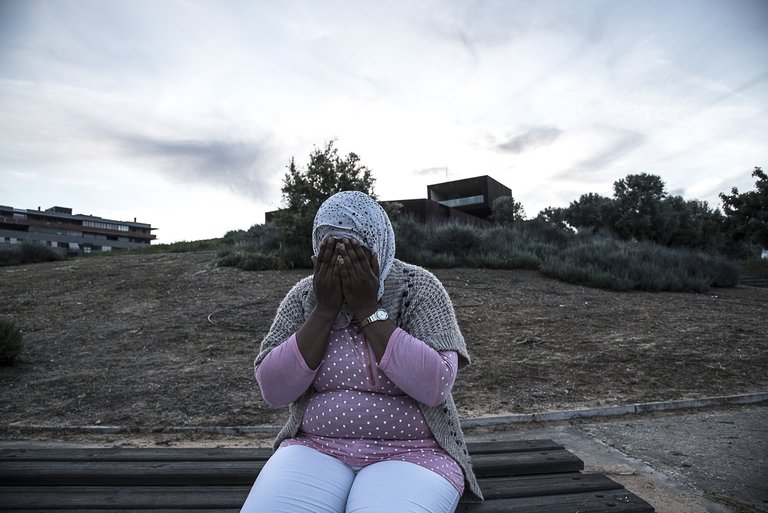
Kalima on the day she filed a complaint against her harasser.
Stefania Prandi
Palos de la Frontera is a town that grew rich from strawberries. Around 80 per cent of the strawberries Germany imports come from the region of Huelva in Andalusia. Under a white sea of plastic greenhouses over 300.000 tons of strawberries are harvested each year, making Andalusia — the so called “California of Europe” – the biggest producer of the fruit in Europe.
As Spain is still grappling with the economic crisis, the so-called “red gold” holds a sweet promise for financial stability and employment. In 2017 exported strawberries worth almost 600 millions euros, according to the Spanish federation of associations of producers and exporters of fruits, vegetables, flowers and live plants (FEPEX). The president of the trade association Freshuelva, Alberto Garrocho called 2017 the “best strawberry harvest in 40 years“.
Locals, however, do not want to discuss the business with the press. Regional trade organisations, such as Freshuelva, and the Department of Agriculture and Fisheries of the Andalusian Council did not answer CORRECTIV’s repeated requests for comment.
“Everyone has heard that abuses happen, but nobody talks”, Pastora Cordero Zorrilla from the union Confederación Sindical de Comisiones Obreras (CCOO) writes in a statement.
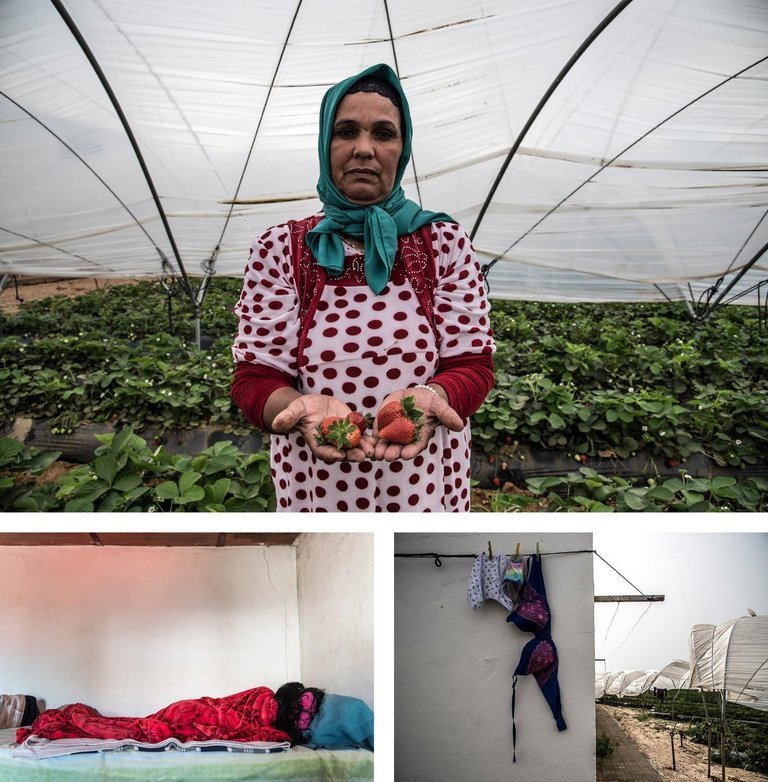
During her previous job this worker was left with no other option, but to eat dog food.
Stefania Prandi
Workers call it the house of the weeping women. Located within the labyrinth of hundreds of greenhouses, separated by muddy trenches, this is where Kalima has been abused. Around a hundred women from Morocco and Romania live here, rising early in the morning to collect crates full of berries whilst the mist still hovers over the fields.
Nobody dares to speak to journalists close to the house. Two Moroccan workers come to a nearby farm, where they have friends, so they are not seen around with strangers. They close the kitchen door and carefully watch the small window. Sabiha has been working here since early March. The boss of the company, she says, is “cruel and heartless.”
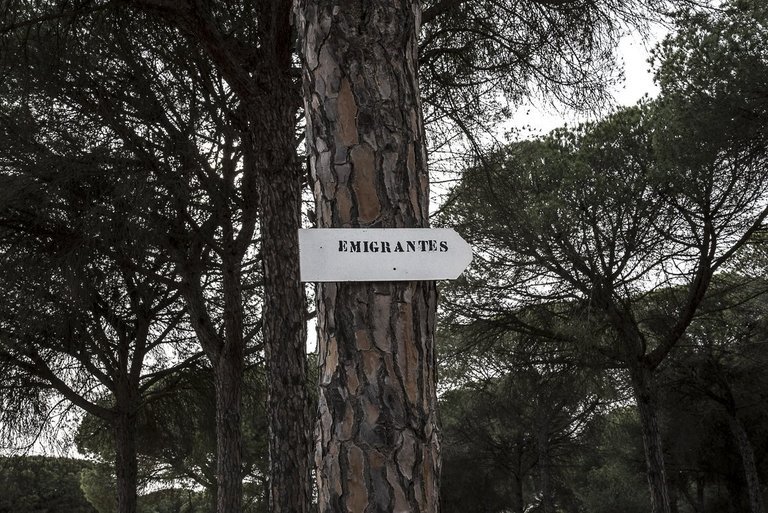
A sign reading „immigrants“ between the towns of Almonte and Palos de la Frontera in Andalusia.
Stefania Prandi
“Juan”, she spits out his name in anger, “shouts because we speak in Moroccan, because we do not know Spanish. He insults us constantly.” Sometimes, Sabiha and her co-workers say, they are not allowed to shower for an entire week. With temperatures well over 40 degrees during the summer and hard labor in the fields, “this is a nightmare”.
She can never pause, she says, even when her back aches painfully from bending over to collect the fruit. “He tells me to fill more crates of strawberries, more and more,” Sabiha adds. Juan hits and kicks the workers, they say. Tears are welling up in Fatima’s eyes, when she speaks about it. “It’s hell on earth”. Sabiha fears retaliation by her boss, this is why her name has been changed.
MARRIED, FEMALE, ILLITERATE
There is an increasing need of cheap, manual labor in Huelva. Coming from regions of Morocco where jobs are scarce, Kalima, Sabiha and her co-workers saw the opportunity to work in Spain as an escape from economic precarity. Starting work at 6am in the morning until lunch and then again in the afternoon. They do not earn more than 30 euros per day. Companies do not compensate them in case of bad weather, temporary reduction of production or for completely arbitrary reasons, such as sanctioning for mistakes. Perpetrators use this financial dependence of the female workers.
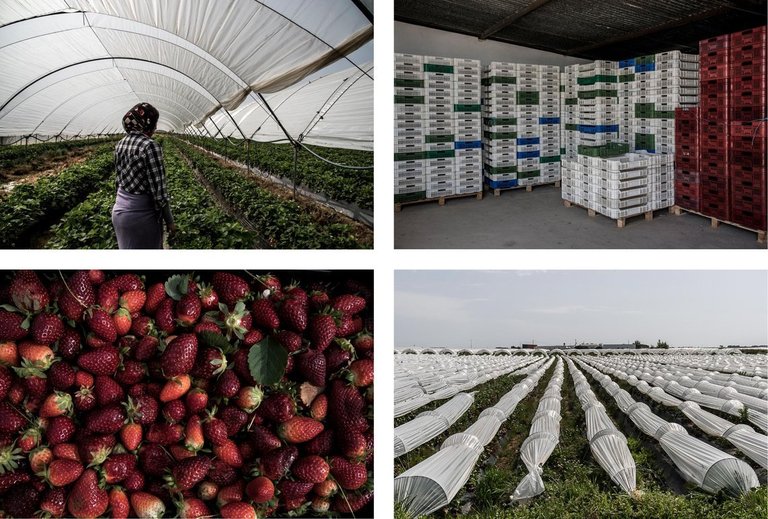
Hiba (upper left) is a Moroccan woman with two children. She is separated from her husband. “Five years ago I was working for a company where I was sexually harassed by the boss. He threatened me, telling that if I didn’t have sex with him he would fire me. I was afraid of losing my job because I had to take care of my children. I’m still taking sleeping pills and often have nightmares.“
Stefania Prandi
According to the women, they have been abandoned by local institutions, unions and women’s rights associations. In interviews, local women’s rights organisations showed a considerable amount of ignorance and denial. Repeated attempts by CORRECTIV to discuss violence against women with local charities, such as the Red Cross, Caritas or the women’s organisations Huelva Acoge and Women in Conflict Zones (Mujer en Zone de Conflictos) were unsuccessful.
Turning to the justice system seems impossible, because the women do not speak Spanish and have a hard time proving the abuse in front of a court. When asked about any statistics or ongoing investigations regarding sexual violence and abuse a local police officer in Palos de la Frontera answered: “Sexual abuse is not a thing of Spain.”
As a consequence only few cases are brought to trial. The Provincial Court of Huelva, on April 2014, found Martin, Carlos Ramon and Ambrosio guilty of an “offense against moral integrity and sexual harassment”. The court documents do not provide the perpetrators’ surnames. Their victims were Moroccan workers who worked for Martin in 2009.
The court documents state that Martin, Carlos Ramon and Ambrosio would insult women with phrases like: “Bitches, we’ll send you back to Morocco. There in your country you’re starving”.
The workers were obligated to urinate in the field and sometimes physically assaulted by the men. One of the workers, Inmaculada, was hit on her legs with an iron bar. They were demanded „sexual favours“ in order to keep their job.
There is another indication: The abortion rate in Palos de la Frontera is very high, with most of the women seeking abortion being migrant workers. A social worker at the local center for public health, Josefa Mora Gomez, who has to sign off every abortion request that goes through the center says: “During the season of gathering fruits, when immigrant workers come, there is a peak in the abortion rate, with majority of request coming from Moroccan, Romanian and Bulgarian women”. According to Gomez, in Palos and the neighbouring town Moguer there were 185 abortions in 2016, 90 per cent chosen by immigrant workers in the field. She presumed that many abortions could be due to rape.
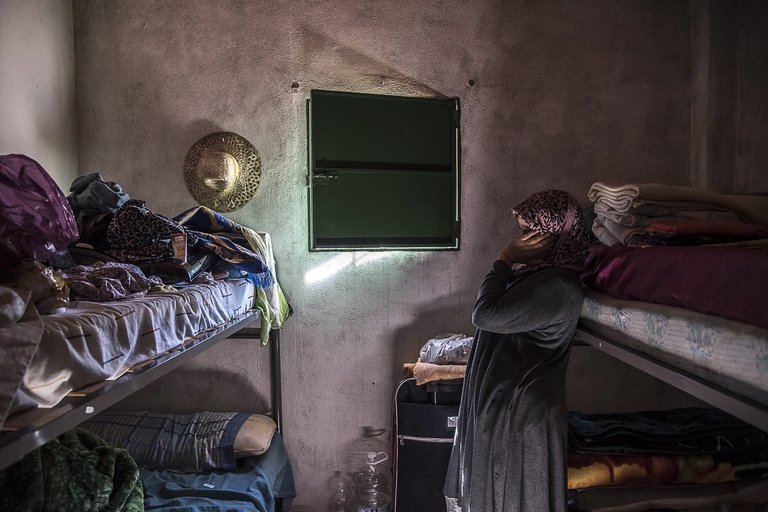
Rachida (50) from Morocco, living in Palos: “I have a terrible headache in the night and an allergy because of the industrial site. I was not sick before coming here. We take a lot of anti-inflammatory medicine because of the factory, four each every day. We cannot breathe because of the smell of the factory, but the boss doesn’t care and says we have to work”. She asked: “Are we humans or animals to them?”
Stefania Prandi
The only union that speaks out about the issue is the Sindicato Andaluz de Trabajadores (SAT). In Huelva they have only two representatives, Jose Antonio Brazo Regalado and his wife. Driving with him through the greenhouses, he lays out his theory on why abuse is such a taboo in Huelva.
“A woman came to me crying, because her boss abused her”, he says. “The feeling of powerlessness is huge. She couldn’t do anything. It is impossible”. As a small union SAT cannot help victims of abuse either, Regalado says, because they rely on women to openly report and many are too afraid — a vicious cycle.
“Huelva has the worst exploitation of agricultural labour in Andalusia, this is slavery”, he says. “Institutions, guardia civil, labor inspection, look the other way.” His union is not allowed to visit workers in the fields. Trying to do so results in farmers threatening Regalado.
Once strawberries leave the field and are packaged for final consumption they receive a Global GAP (Good Agricultural Practice) number. Global GAP is a company that certifies that a producer in the field of crops, livestock or aquaculture is “safe and sustainable.” According to the organisation it is the most widely accepted private sector food safety certification in the world.
Using the Global GAP certificates CORRECTIV was able to find, that the employer of Kalima is supplying a larger cooperative called Sociedad Cooperativa Andaluz Santa Maria de la Rabida, better known by their brand name “Fréson de Palos” . As of 2014 Sociedad Cooperativa Andaluz Santa Maria de la Rabida claimed to be the “biggest strawberry producer in all of Europe”.
Global GAP said in a statement that it had not been aware of sexual abuse in the Huelva region. It said it would investigate the situation now. It said that the social well-being of workers was one of the most important criteria in its certification decision.
“Fréson de Palos” strawberries are exported to countries all over Europe, including Germany, as a company spokesperson confirmed in a phone call with CORRECTIV in early March. During this call the spokesperson also confirmed that the employer of Khadija is a „business partner“ and supplies them with strawberries. The company did not respond to a written request for comment.
It is very likely that strawberries from the fields of Huelva, in which sexual exploitation of women is happening, end up in many German supermarkets. One example: CORRECTIV found strawberries from the Sociedad Cooperativa Andaluz Santa Maria de la Rabida in a Lidl supermarket in a town near the Western city of Münster.
In a statement to CORRECTIV, Lidl said social and ecological responsibility was part of its company codex, to which its suppliers also need to adhere to. It said that its supply chain was certified by Global GAP and that its suppliers were undergoing regular checks. „We distance ourselves from any violation of human and labour rights“, it said, adding that it would investigate any violations.
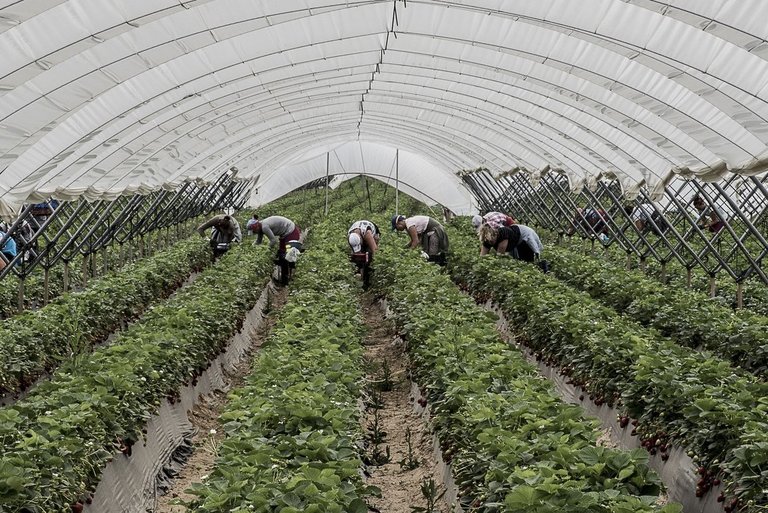
A female worker in Palos: „We would like to tell the buyer of the strawberries that they need to think of us and to think under which conditions we work, what we go through and how much we suffer.“
Stefania Prandi
As for all the women CORRECTIV interviewed in Italy, Spain and Morocco, reporting her abuse to the police did not improve Kalimas situation. Even though she did a rape kit, in which a gynaecologist and a forensic doctor state “sexual aggression”, they also tell her that without a proof, for example a sample of sperm it would be hard to persecute Abdelrahman.
Kalima is transferred into a woman’s shelter the same day she reports to the police. After she testified in court against her rapist, he continues to threaten Kalima with death over the phone. CORRECTIV accompanied her from the moment she took the decision to report until she was moved into a safe house. CORRECTIV stayed in touch with Kalima over phone. She returned to Morocco a few months later. But working in Spain was the only way for her to generate income and feed her family and her bedridden husband. A local charity is giving her vegetables and flour for free.
Kalimas family does not know what has happened to her in Spain. Her rapist is currently on trial. As of autumn 2017, workers confirmed to CORRECTIV over the phone that he continues to work in the same company.

According to the Spanish union CCOO 3,666 women traveled back and forth from Morocco to Huelva region to work as fruit pickers in the first half of 2017. Because it is cheaper than flying, most of them use the ferry.
Stefania Prandi
Correction, added May 9th, 2018: We wrote in an earlier version that the company Global GAP certifies agricultural producers. Instead, the company develops standards based on which products are certified by separate institutions.
Faten Akhatou Bouchkaren contributed to this story.
This investigation was funded by crowdfunding.correctiv.org. We thank the supporters for their contribution:
Elisabeth Ferrari, Mari Stephani, Jochem Theis, Uli Kindermann, Renata Piccolo, Federica Guerra, Wolfgang Weidtmann, Rene Seyedi, Michael Rasenberger, Gerhard Dimmling-Jung, Marialuisa Parodi, Vanessa Boysen, Karoline Mikus, Margit Gatzke, Monika Pater, Isabel Stettin, Marcus Beisswanger, Edith Luschmann, Valentina Lanuara, Krsto Lazarevic, Birgit Nieskens, Philipp Burgmer, Nicole Graaf, Christoph Wunnerlich, Patrick Bauer, Philipp Kayser, Emma Schiavon, Vanessa Carboni, Silvia Corti, Raffael Vogler
This investigation was also funded by the Swiss Volkart Foundation.

